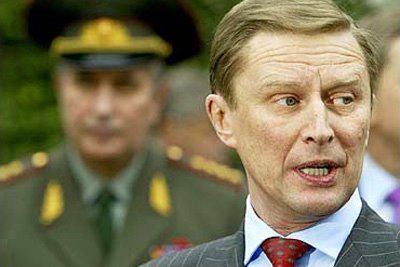
RUSSIA WARNS OF MISSILE FORWARD-DEPLOYMENT IN KALININGRAD REGION
Publication: Eurasia Daily Monitor Volume: 4 Issue: 131
By:

On July 4, First Deputy Prime Minister Sergei Ivanov warned that Russia could deploy medium-range missiles in the Kaliningrad oblast — opposite Lithuania and Poland — if the United States turns down Russia’s proposals on anti-missile defense in Europe. The implicit threat to these staunch U.S. allies comes only two days after Russian President Vladimir Putin earned yet another credit of trust — “Do I trust him? Yes, I trust him” — from U.S. President George W. Bush during their informal meeting at Kennebunkport in the Bush family compound.
Ivanov, until recently defense minister and now presumed to be President Vladimir Putin’s favorite successor to the presidency, warned: “If our proposals are accepted, Russia would no longer need to deploy new missile systems in our European territory, including Kaliningrad.” According to Ivanov, such a deployment would constitute an “asymmetrical and effective response” by Russia against U.S.-proposed anti-missile defense elements in Central Europe (Itar-Tass, RIA-Novosti, July 4).
Moscow denounces U.S. plans to install elements of anti-missile defense systems in Poland and the Czech Republic as unacceptable to Russia. Instead, the Kremlin proposes joint use of Azerbaijan’s Russian-operated Gabala radar and a new radar to be completed in southern Russia, as well as joint NATO-Russia centers in Brussels and Moscow to manage a common anti-missile system. However, U.S. and NATO experts deem such a solution inadequate on many technical and strategic policy counts.
Putin himself warned several times in recent weeks that Russia would respond by targeting European countries with its missiles, “turning Europe into a powder keg.” However, Ivanov’s is the first warning of a possible forward deployment of medium-range missiles in the Kaliningrad oblast. Such a move would put a substantial swath of NATO territory within range of those Russian missiles, without overtly breaching the INF Treaty-mandated limitations on missile ranges.
The most conspicuous asymmetry is not the geographical one to which Ivanov mainly alludes. Rather, the asymmetry resides in the offensive purpose and mission of the Russian missiles that would be deployed, versus the purely defensive anti-missile elements proposed to be sited in Poland and the Czech Republic.
Ivanov’s warning almost certainly refers to the new-generation Iskander missile, presumably its cruise version Iskander-K, which Russia tested successfully on May 29. Its actual range is not known with certainty, but it is limited in principle to 500 kilometers in accordance with the INF Treaty, which bans land-based cruise as well as ballistic missiles with ranges of more than 500 kilometers. At present, Russia is believed to station obsolete Tochka battlefield missiles, with less than half the range of Iskander, in the Kaliningrad oblast.
At the moment, Moscow justifies the testing and possible deployment of Iskander and a new intercontinental ballistic missile as responses to the U.S.-proposed anti-missile defense elements in Central Europe. This rationalization is mainly designed for European consumption and wedge driving within NATO. However, Moscow has in recent weeks challenged NATO on a wide range of European security issues, which in addition to anti-missile defense include also U.S. military installations in Romania and Bulgaria, the CFE Treaty, and the INF Treaty, brandishing possible Russian “asymmetric responses” on all those counts.
Thus, Putin’s warnings to target Russian missiles on Europe — and Ivanov’s hint at forward-deploying missiles in Kaliningrad — are to be regarded as an all-purpose threat, repeatable against any Western security interests, not just missile defense in Central Europe. If the ploy proves effective on this issue, the Kremlin will almost certainly feel emboldened to re-use the same ploy to obtain satisfaction on other Euro-Atlantic security issues. By citing imaginary threats to itself and brandishing ostensible countermeasures, Moscow hopes to obtain a voice and a veto on U.S. and NATO decisions as well as on security arrangements involving new member countries of the Alliance.
Lithuania is responding calmly to Ivanov’s warning about possible missile deployment in Kaliningrad oblast. In the initial reactions from Vilnius, Prime Minister Gediminas Kirkilas, Minister of Foreign Affairs Petras Vaitiekunas, and the parliamentary foreign affairs committee chairman Justinas Karosas are making the following points:
1) the warning is hypothetical at this stage;
2) Russia considers deploying an offensive system against a Western defensive system;
3) Lithuania would definitely protest if the deployment intention turns out to be real;
4) the issue is of concern to all member countries of NATO and the European Union; and
5) Moscow’s hypothetical warning underscores the need for demilitarization of the Kaliningrad oblast (BNS, July 5).
The initial response at NATO on the political level tends to downplay Putin’s and Ivanov’s warnings by connecting them with the upcoming parliamentary and presidential elections in Russia. Such a response has the merit of lowering the international political stakes and reassuring those easily unnerved sections among European publics and governments. However, Russia’s elections are not contested elections and the Kremlin hardly needs to fan external tensions for internal political gains. In fact, Moscow is reactivating Cold-War tactics in attempting to overturn, step-by-step and issue-by-issue, the post-Cold-War status quo.




